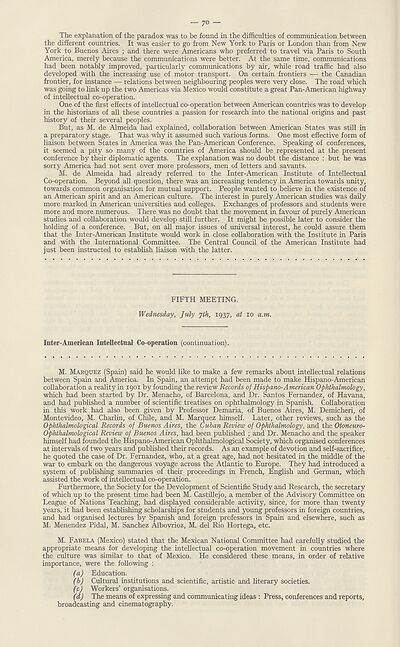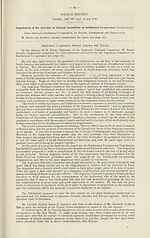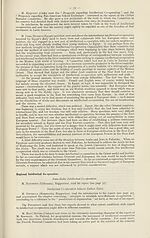International > Proceedings of the second General conference of national committees on intellectual co-operation, Paris, July 5th-9th, 1937
(72)
Download files
Complete book:
Individual page:
Thumbnail gallery: Grid view | List view

70 —
The explanation of the paradox was to be found in the difficulties of communication between
the different countries. It was easier to go from New York to Paris or London than from New
York to Buenos Aires ; and there were Americans who preferred to travel via Paris to South
America, merely because the communications were better. At the same time, communications
had been notably improved, particularly communications by air, while road traffic had also
developed with the increasing use of motor transport. On certain frontiers — the Canadian
frontier, for instance — relations between neighbouring peoples were very close. The road which
was going to link up the two Americas via Mexico would constitute a great Pan-American highway
of intellectual co-operation.
One of the first effects of intellectual co-operation between American countries was to develop
in the historians of all these countries a passion for research into the national origins and past
history of their several peoples.
But, as M. de Almeida had explained, collaboration between American States was still in
a preparatory stage. That was why it assumed such various forms. One most effective form of
liaison between States in America was the Pan-American Conference. Speaking of conferences,
it seemed a pity so many of the countries of America should be represented at the present
conference by their diplomatic agents. The explanation was no doubt the distance : but he was
sorry America had not sent over more professors, men of letters and savants.
M. de Almeida had already referred to the Inter-American Institute of Intellectual
Co-operation. Beyond all question, there was an increasing tendency in America towards unity,
towards common organisation for mutual support. People wanted to believe in the existence of
an American spirit and an American culture. The interest in purely American studies was daily
more marked in American universities and colleges. Exchanges of professors and students were
more and more numerous. There was no doubt that the movement in favour of purely American
studies and collaboration would develop still further. It might be possible later to consider the
holding of a conference. But, on all major issues of universal interest, he could assure them
that the Inter-American Institute would work in close collaboration with the Institute in Paris
and with the International Committee. The Central Council of the American Institute had
just been instructed to establish liaison with the latter.
FIFTH MEETING.
Wednesday, July yth, 1937, at 10 a.m.
Inter-American Intellectual Co-operation (continuation).
M. Marquez (Spain) said he would like to make a few remarks about intellectual relations
between Spain and America. In Spain, an attempt had been made to make Hispano-American
collaboration a reality in 1901 by founding the review Records of Hispano-American Ophthalmology,
which had been started by Dr. Menacho, of Barcelona, and Dr. Santos Fernandez, of Havana,
and had published a number of scientific treatises on ophthalmology in Spanish. Collaboration
in this work had also been given by Professor Demaria, of Buenos Aires, M. Demicheri, of
Montevideo, M. Charlin, of Chile, and M. Marquez himself. Later, other reviews, such as the
Ophthalmological Records of Buenos Aires, the Cuban Review of Ophthalmology, and the Otoneuro-
Ophthalmological Review of Buenos Aires, had been published ; and Dr. Menacho and the speaker
himself had founded the Hispano-American Ophthalmological Society, which organised conferences
at intervals of two years and published their records. As an example of devotion and self-sacrifice,
he quoted the case of Dr. Fernandez, who, at a great age, had not hesitated in the middle of the
war to embark on the dangerous voyage across the Atlantic to Europe. They had introduced a
system of publishing summaries of their proceedings in French, English and German, which
assisted the work of intellectual co-operation.
Furthermore, the Society for the Development of Scientific Study and Research, the secretary
of which up to the present time had been M. Castillejo, a member of the Advisory Committee on
League of Nations Teaching, had displayed considerable activity, since, for more than twenty
years, it had been establishing scholarships for students and young professors in foreign countries,
and had organised lectures by Spanish and foreign professors in Spain and elsewhere, such as
M. Menendez Pidal, M. Sanchez Albovrioz, M. del Rio Hortega, etc.
M. Fabela (Mexico) stated that the Mexican National Committee had carefully studied the
appropriate means for developing the intellectual co-operation movement in countries where
the culture was similar to that of Mexico. He considered these means, in order of relative
importance, were the following :
(a) Education.
(b) Cultural institutions and scientific, artistic and literary societies.
(c) Workers’ organisations.
(d) The means of expressing and communicating ideas : Press, conferences and reports,
broadcasting and cinematography.
The explanation of the paradox was to be found in the difficulties of communication between
the different countries. It was easier to go from New York to Paris or London than from New
York to Buenos Aires ; and there were Americans who preferred to travel via Paris to South
America, merely because the communications were better. At the same time, communications
had been notably improved, particularly communications by air, while road traffic had also
developed with the increasing use of motor transport. On certain frontiers — the Canadian
frontier, for instance — relations between neighbouring peoples were very close. The road which
was going to link up the two Americas via Mexico would constitute a great Pan-American highway
of intellectual co-operation.
One of the first effects of intellectual co-operation between American countries was to develop
in the historians of all these countries a passion for research into the national origins and past
history of their several peoples.
But, as M. de Almeida had explained, collaboration between American States was still in
a preparatory stage. That was why it assumed such various forms. One most effective form of
liaison between States in America was the Pan-American Conference. Speaking of conferences,
it seemed a pity so many of the countries of America should be represented at the present
conference by their diplomatic agents. The explanation was no doubt the distance : but he was
sorry America had not sent over more professors, men of letters and savants.
M. de Almeida had already referred to the Inter-American Institute of Intellectual
Co-operation. Beyond all question, there was an increasing tendency in America towards unity,
towards common organisation for mutual support. People wanted to believe in the existence of
an American spirit and an American culture. The interest in purely American studies was daily
more marked in American universities and colleges. Exchanges of professors and students were
more and more numerous. There was no doubt that the movement in favour of purely American
studies and collaboration would develop still further. It might be possible later to consider the
holding of a conference. But, on all major issues of universal interest, he could assure them
that the Inter-American Institute would work in close collaboration with the Institute in Paris
and with the International Committee. The Central Council of the American Institute had
just been instructed to establish liaison with the latter.
FIFTH MEETING.
Wednesday, July yth, 1937, at 10 a.m.
Inter-American Intellectual Co-operation (continuation).
M. Marquez (Spain) said he would like to make a few remarks about intellectual relations
between Spain and America. In Spain, an attempt had been made to make Hispano-American
collaboration a reality in 1901 by founding the review Records of Hispano-American Ophthalmology,
which had been started by Dr. Menacho, of Barcelona, and Dr. Santos Fernandez, of Havana,
and had published a number of scientific treatises on ophthalmology in Spanish. Collaboration
in this work had also been given by Professor Demaria, of Buenos Aires, M. Demicheri, of
Montevideo, M. Charlin, of Chile, and M. Marquez himself. Later, other reviews, such as the
Ophthalmological Records of Buenos Aires, the Cuban Review of Ophthalmology, and the Otoneuro-
Ophthalmological Review of Buenos Aires, had been published ; and Dr. Menacho and the speaker
himself had founded the Hispano-American Ophthalmological Society, which organised conferences
at intervals of two years and published their records. As an example of devotion and self-sacrifice,
he quoted the case of Dr. Fernandez, who, at a great age, had not hesitated in the middle of the
war to embark on the dangerous voyage across the Atlantic to Europe. They had introduced a
system of publishing summaries of their proceedings in French, English and German, which
assisted the work of intellectual co-operation.
Furthermore, the Society for the Development of Scientific Study and Research, the secretary
of which up to the present time had been M. Castillejo, a member of the Advisory Committee on
League of Nations Teaching, had displayed considerable activity, since, for more than twenty
years, it had been establishing scholarships for students and young professors in foreign countries,
and had organised lectures by Spanish and foreign professors in Spain and elsewhere, such as
M. Menendez Pidal, M. Sanchez Albovrioz, M. del Rio Hortega, etc.
M. Fabela (Mexico) stated that the Mexican National Committee had carefully studied the
appropriate means for developing the intellectual co-operation movement in countries where
the culture was similar to that of Mexico. He considered these means, in order of relative
importance, were the following :
(a) Education.
(b) Cultural institutions and scientific, artistic and literary societies.
(c) Workers’ organisations.
(d) The means of expressing and communicating ideas : Press, conferences and reports,
broadcasting and cinematography.
Set display mode to:
![]() Universal Viewer |
Universal Viewer | ![]() Mirador |
Large image | Transcription
Mirador |
Large image | Transcription
Images and transcriptions on this page, including medium image downloads, may be used under the Creative Commons Attribution 4.0 International Licence unless otherwise stated. ![]()
| League of Nations > International > Proceedings of the second General conference of national committees on intellectual co-operation, Paris, July 5th-9th, 1937 > (72) |
|---|
| Permanent URL | https://digital.nls.uk/195218111 |
|---|
| Shelfmark | LN.XII |
|---|
| Description | Over 1,200 documents from the non-political organs of the League of Nations that dealt with health, disarmament, economic and financial matters for the duration of the League (1919-1945). Also online are statistical bulletins, essential facts, and an overview of the League by the first Secretary General, Sir Eric Drummond. These items are part of the Official Publications collection at the National Library of Scotland. |
|---|---|
| Additional NLS resources: |
|

